Conspiracy and conspirator are terms which have become more common in our vocabulary, especially since the start of 2020. But could these terms really be applied to some of the top Civil Servants within the Northern Ireland Department of Health?
Let’s look at the definition of “conspiracy” and “conspirator”.
For now, just bear these definitions in mind and I will return to this question later in this report.
What I will look at in this report is the correspondence that took place between the elected Democratic Unionist Party MLA, Paul Frew, and senior civil servants, including the Chief Medical Officer, as Mr Frew pushed them to investigate the large numbers of non-Covid excess deaths being experienced in Northern Ireland. Most of these emails were internal between the senior civil servants and not written for the public eye. But as Mr Frew was getting nowhere in his communications with the Department of Health he decided to request the communications going on behind the scenes between the various DoH employees regarding his requests. What follows are excerpts of this entire communication chain as we seek to ascertain if senior civil servants conspired to cover up for these excess deaths as the email chain certainly suggests.
Mortality Displacement
Following what our health officials referred to as “a surge of biblical proportions” (or even after a bad flu season), we would expect to see lower-than-average deaths in the years that followed. This is because the effects of a pandemic or bad flu season would take more lives and people would die earlier than expected. The following years should see lower-than-expected deaths because some who would have died this year, would have already died earlier. This is known as “mortality displacement” and has been the case historically after any pandemic or bad flu season.
However, in Northern Ireland (and in many other developed countries around the world) we are again experiencing excess deaths in 2022, a subject we have written about before. Since our earlier report, the trend has continued upward. The vast majority of these excess deaths are not related to Covid. It is therefore extremely concerning that we are experiencing the opposite of mortality displacement, with no official explanation as to what is causing a large number of deaths.
The 5-Year-Average
When we have more people dying than expected, the number of deaths above this level is defined as excess deaths. This is normally measured against the average of the previous 5-year death total. Since 2020, this 5-year average has been calculated differently across nations as the high level of excess deaths in 2020 and 2021 has the potential to skew a normal 5-years of deaths average upwards, in turn reducing the impact of any excess deaths.
In Northern Ireland, NISRA uses a straight previous 5 years (2017-2021) to calculate this average (as defined on Page 8 of this report). This includes both “pandemic years” and is more likely to skew the result in the following year, under-reporting the real level of excess deaths or over-reporting the mortality displacement if we had fewer deaths than normal. In England & Wales, the ONS use 2016-2019 and 2021. They have excluded one of the pandemic years (2020) in order to try and “normalize” the average. In Europe, they have reduced the average to 4 years and used the years immediately preceding Covid (2016-2019) so that the higher deaths of 2020 &2021 have no effect on the average to give a truer representation of this year’s deaths in comparison. The graph below displays the cumulative excess deaths in Northern Ireland using all three calculations to date (up to 9 December) and shows the effect using a particular average can have.

So it is crystal clear that Northern Ireland is experiencing an increasing excess death problem for the third year in a row. The difference this year is that Covid is not responsible for these deaths. We had reduced deaths for the first couple of months of the year, which we would have expected with mortality displacement. Also, despite the clear evidence from South Africa, the Omicron variant was not the danger we had been warned about. Deaths attributable to Omicron since the start of 2022 were 93% lower than SAGE had predicted.

Northern Ireland Chief Medical Officer – Michael McBride
Michael McBride is well known to readers of Citizen Journalists and the wider Northern Ireland public through his regular appearances at the lectern in the Executive daily updates over the period 2020/2021.
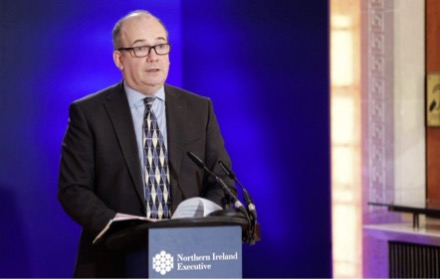
He is most infamous for his attack on people who had a legitimate exemption from wearing a face mask, when through the Executive, he tried to force an amendment to the law, proposing that those exempt from wearing a face mask would have to prove their exemption, as well as removing the reasonable excuse for severe stress clause. This ended with the changes eventually being withdrawn without ever having been fully implemented after considerable public pushback.
Another of his false and unsubstantiated claims was his assertion that vaccines would stop the spread of Covid, a claim he used to guilt-trip his own son into taking the vaccine.
Paul Frew’s Concern on Excess Deaths
Northern Ireland began experiencing excess deaths from March 2022 onwards and the level has continued to rise since then. Paul Frew, DUP MLA (Member of the Legislative Assembly) for North Antrim has been tweeting consistently since June 2022 about his concerns regarding the level of non-Covid excess deaths in Northern Ireland. On 27th September 2022, he wrote to the Chief Medical Officer, Michael McBride, asking for an investigation into what could be causing these deaths.
Under the circumstances, this seems like a perfectly reasonable request to the Chief Medical Officer, even if he needs to involve the other top doctors and experts within the Department of Health. After all, these are the supposed top minds charged with responsibility for the health and well-being of the population.
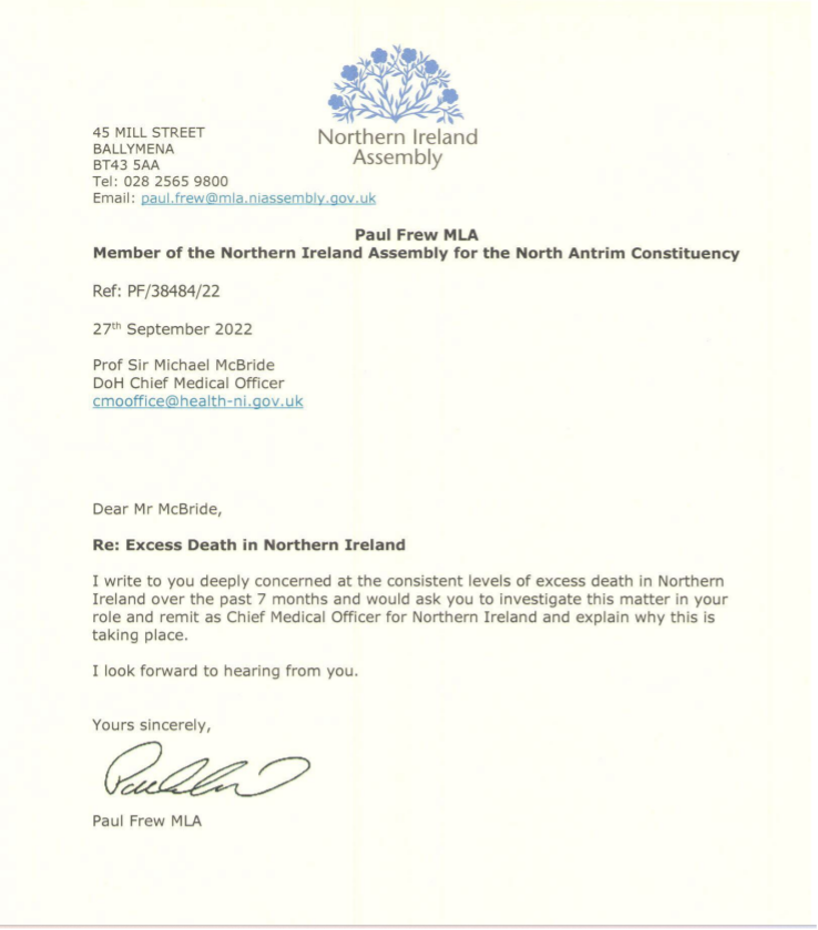
Mr Frew received a reply to his letter on 12th October – but the reply was not from Michael McBride to whom he had addressed his request. Instead, the reply was signed by Robin Swann, the interim Minister of Health. Additionally, it did not address the core issues of the original request in that no investigation into the cause of the excess deaths was carried out, but was merely described as a “complex area”.
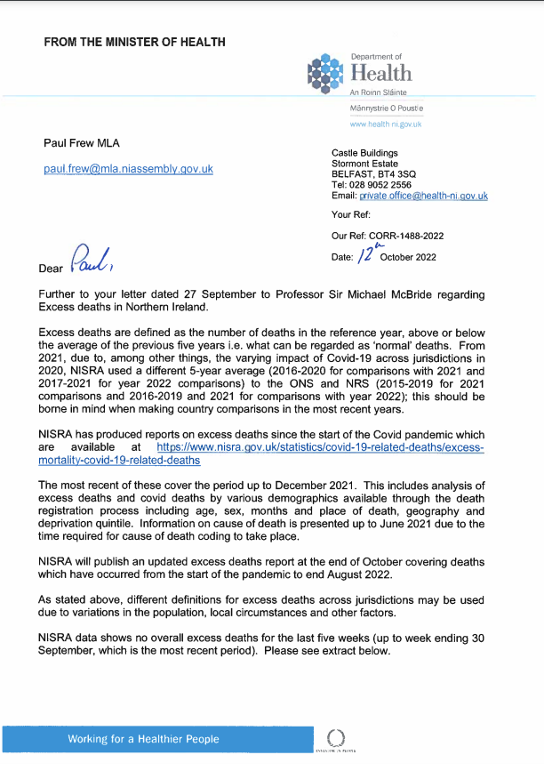
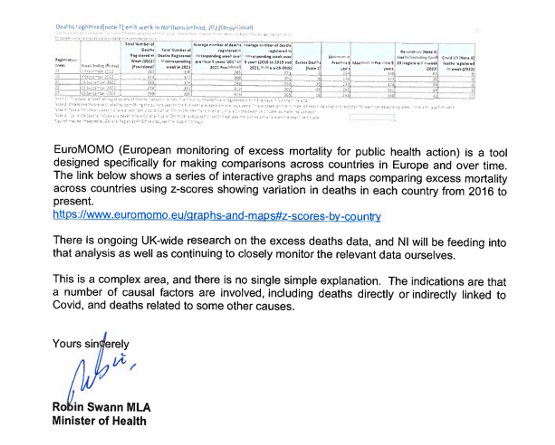
It may well be a complex area, which is why Mr Frew asked that our “best minds” look into it. It seems though that they would rather ignore the issue altogether.
Unhappy with the reply received, in that it did not address the salient point of his request, Mr Frew decided to submit a Freedom of Information request seeking copies of all correspondence within the Department of Health relating to the response of his letter to the Chief Medical Officer on 27 September.
Having received a reply to his FOI request, Mr Frew tweeted out, into the public domain, some of the information that he obtained. Following our request, Mr Frew has shared the results of his FOI request with us at Citizen Journalists. We have redacted the personal names of junior officials and direct email addresses from the correspondence for publication purposes.
Were this not such a serious subject, the treatment of Mr Frew’s request may look like a script from a comedy sketch. The question that needs to be asked is, is this ineptness within the top officials of the Department of Health or a deliberate conspiracy to obstruct and/or obfuscate in any reply?
Keep in mind, Mr Frew has written directly to Michael McBride as the Chief Medical Officer within the Department of Health for Northern Ireland asking him as a medical professional to investigate the causation of the high number of excess deaths.
The first reaction of our Chief Medical Officer on receipt of Mr Frew’s letter was nothing more than an attempt to sweep it off his desk and refer it to the DoH Private Office for a response.
Internal Civil Servant Responses to Paul Frew’s Correspondance
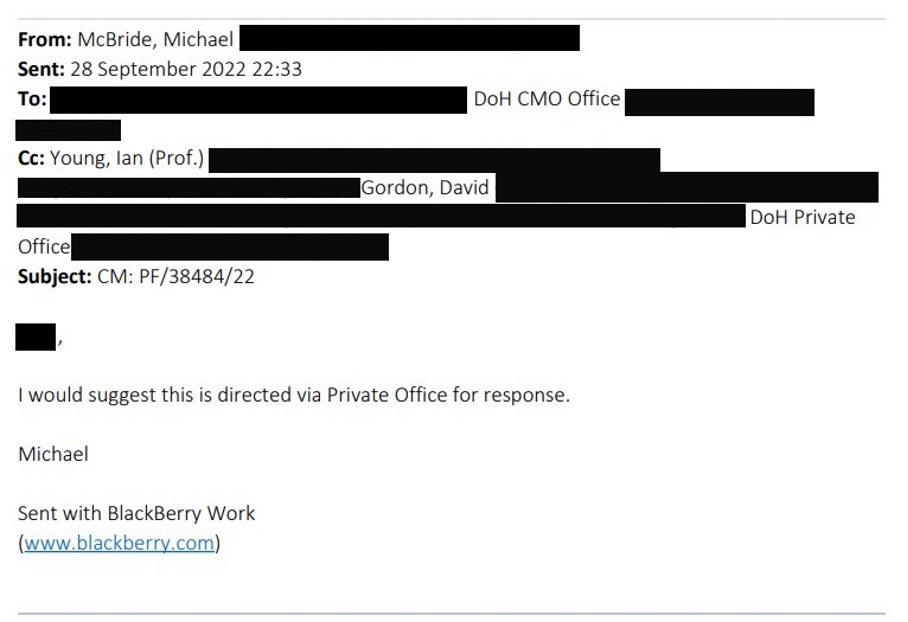
Someone not so well-known to the general public is Dr Eugene Mooney who is the Director of Information & Analysis at the Department of Health, Social Services and Public Safety. A year ago Dr Mooney was named the Ulster University Distinguished Graduate of the Year 2021. He is a regular contributor to the correspondence chain regarding Mr Frew’s letter, showing that many of the top officials were involved.
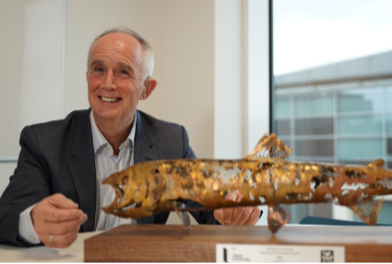
Eugene Mooney replies to Michael McBride and suggests that the request be transferred to NISRA, which collates the statistics on excess deaths. Although NISRA knows the number of excess deaths, they have no remit to investigate the causes of death, which is a medical/health matter. In Northern Ireland, NISRA comes under the control of the Department of Finance. So the suggestion was for the Dept of Health to ask the Dept of Finance why so many people are dying, which seems a strange request to make.
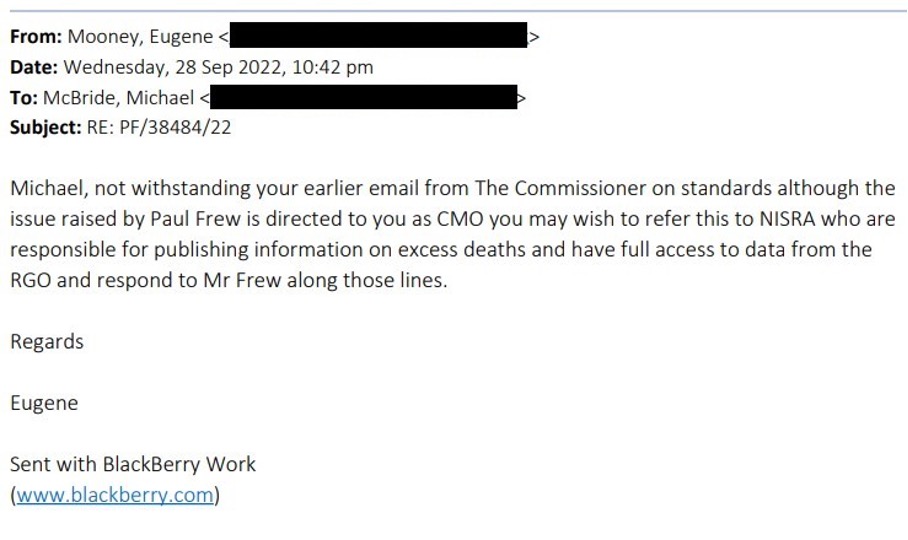
NISRA publish the data on excess deaths every week, so Mr Frew is already fully aware of the levels of excess deaths, which is why he made the request for a causal investigation from the Dept of Health. However, our CMO Michael McBride thinks this is a great idea as it will once again disappear from his desk, and he tells the Private Office to redirect the request to NISRA.
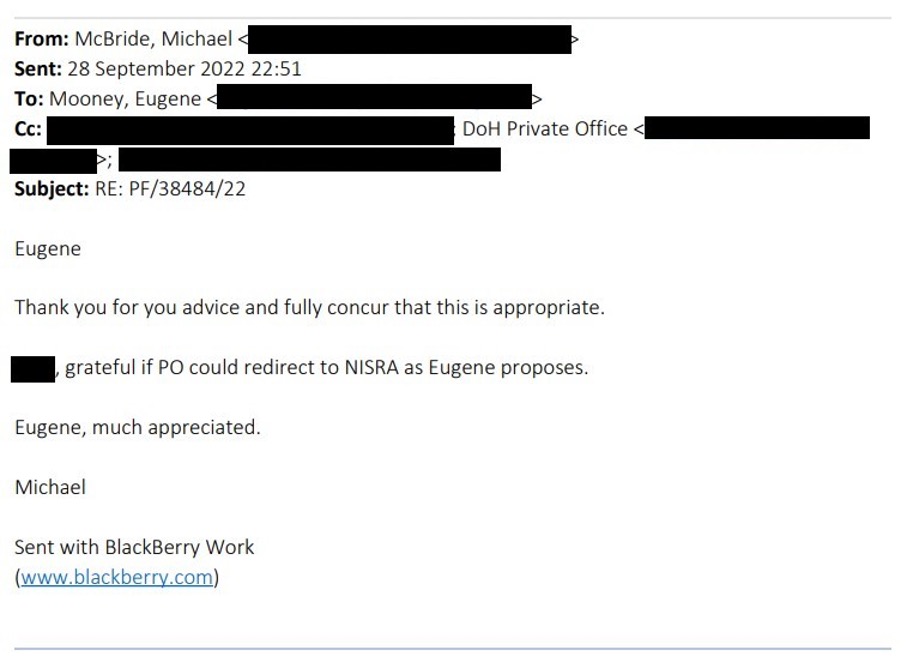
The Private Office duly comply and send an email to the Dept of Finance requesting the transfer of the investigation to them, with the erroneous statement that the request appears to fall within their remit.
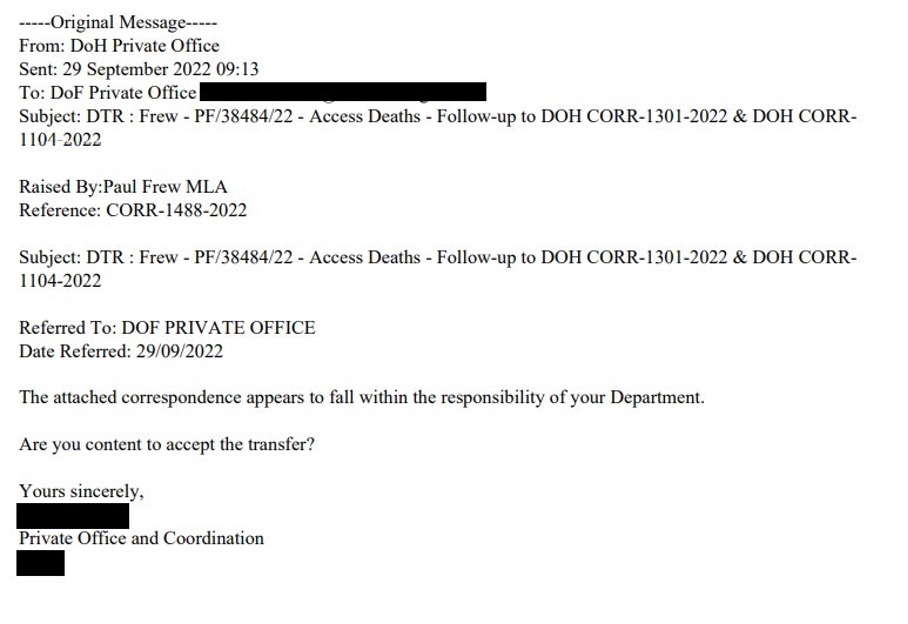
As expected the Dept of Finance don’t relish the idea of this landing on their desk as they have no idea of the causes, nor the expertise to investigate the causes, of the excess deaths and so rightly refuse the transfer.
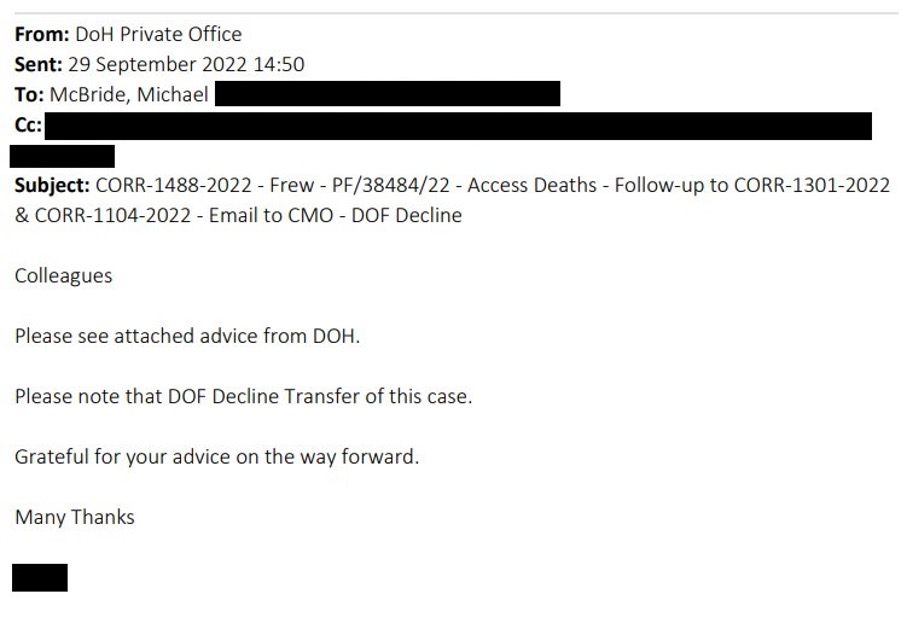
They set out their reasoning for refusing the transfer, even though it isn’t that difficult to understand why. The request from Mr Frew is asking for an investigation into the causes of the excess deaths and NISRA just collates the figures, not the causes. They suggest a part input, but repeat that any of their input is “really not answering the question”. I have highlighted extracts of their response for emphasis.
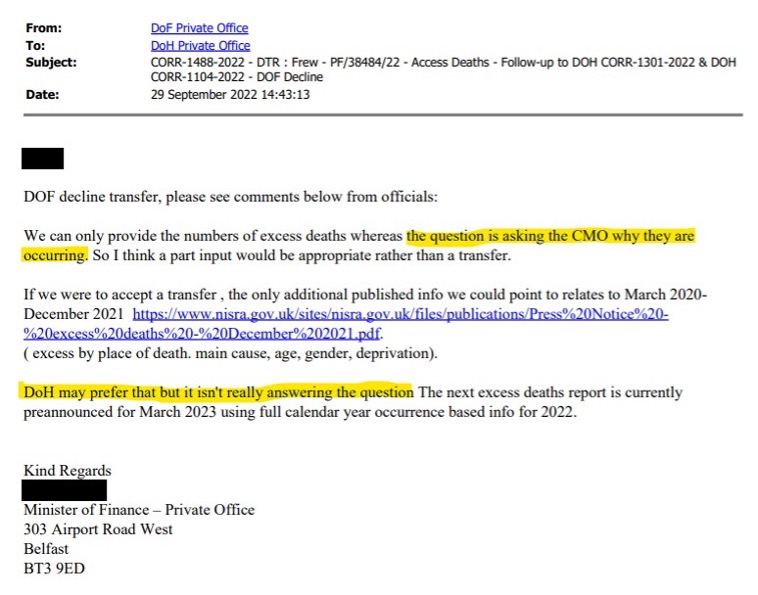
Even though the Dept of Finance leaves no room for ambiguity in their reply – Michael McBride seems confused with their response and can’t hide his disappointment at their decision.
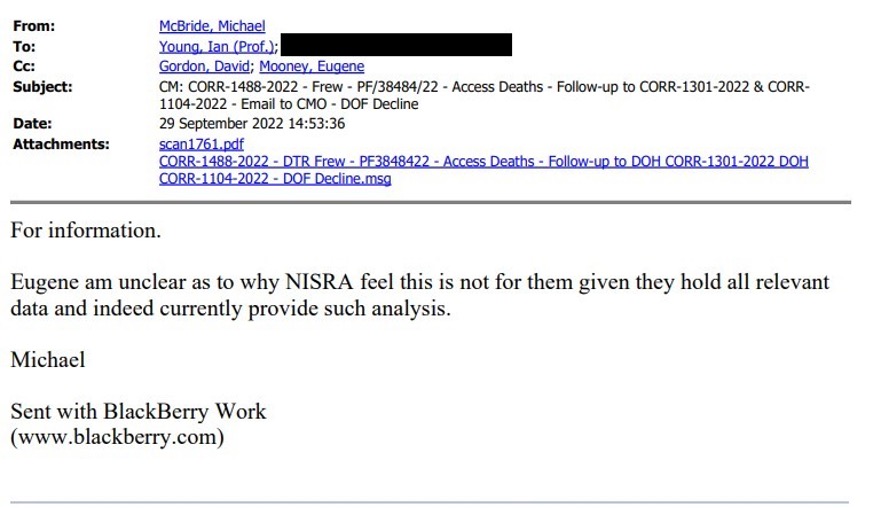
As a member of the public, I am also unclear why our Chief Medical Officer feels that the question does not apply to HIM. The causes of excess death are clearly a health issue, the reason why Mr Frew’s request was sent directly to Michael McBride in the first place. Surely it can’t be that the basic comprehension skills of those at the Department of Finance in reading the original letter from Paul Frew are greater than those of the Department of Health?
Dr Mooney replies to Michael McBride that having spoken with NISRA, they are prepared to do a “partial input”. He sees this as a three-stranded approach and that he wants “to ensure that NISRA sees this type of work as something they should be making a significant contribution to”.
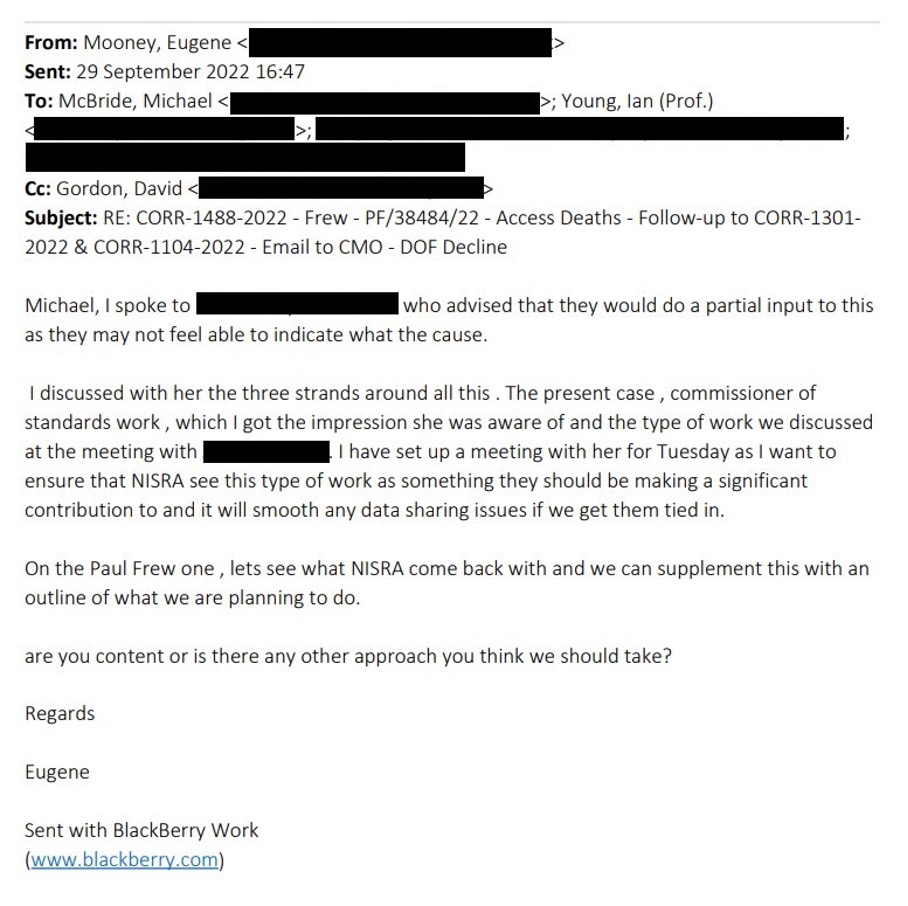
McBride replies that “none of us can be certain on causal factors”, but you cannot find that for which you do not look. Perhaps you should start an official investigation as per Paul Frew’s request Michael?
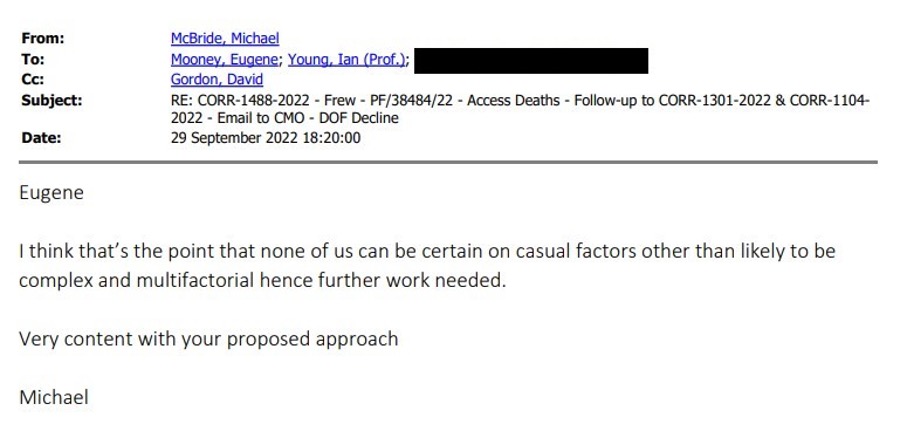
You may also have noted at this stage that Michael McBride was including both Ian Young and David Gordon in the correspondence chain. Ian Young is the Northern Ireland Chief Scientific Adviser within the Department of Health, who failed in his attempt to have the High Court block an investigation against him in the hyponatraemia scandal. He launched his legal bid 2 weeks before he went on leave for health grounds. David Gordon (who is an “ex Stormont spin doctor and former editor of the BBC’s Stephen Nolan Show) is the Director of Communications for the Health and Social Care (HSC) service within the Department of Health.
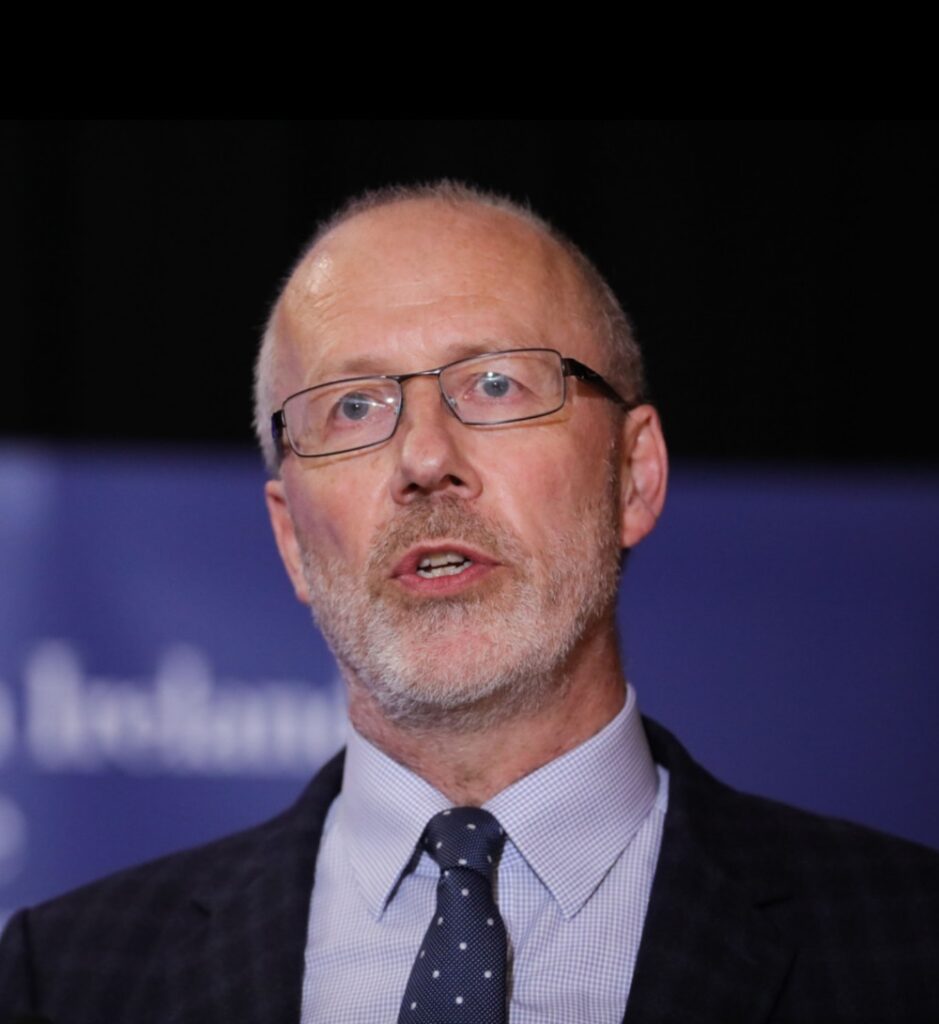

Now David Gordon enters the correspondence chain with what he seemingly believes is a smoking gun to counter Paul Frew’s original request. We can see that he has also copied Lourda Geoghegan into the correspondence chain. Dr Lourda Geoghegan is the Deputy Chief Medical Officer for Northern Ireland.
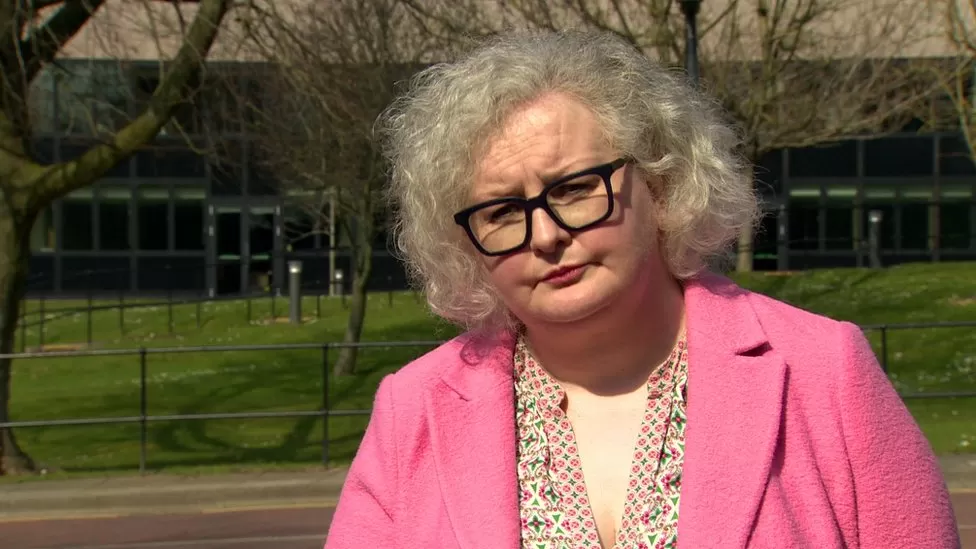
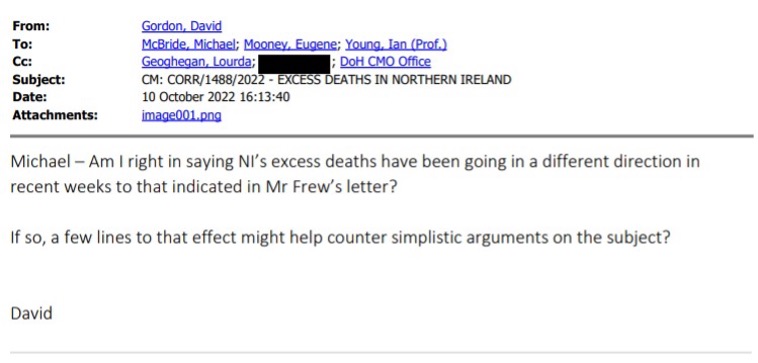
Right on cue, Ian Young the Chief Scientific Adviser joins the conversation backing up the claim made by David Gordon, even copying the table from NISRA for good measure.
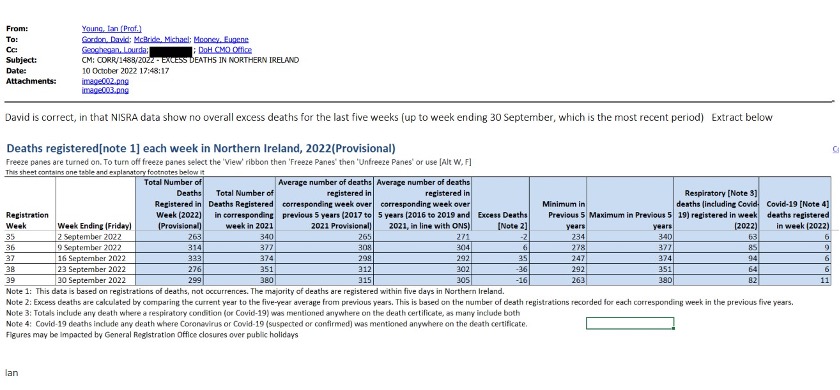
Now it appears that every top official within the Department of Health is starting to put the wagons in a circle.
A Closer Look at the Data
Let’s have a closer look at what they are claiming and how they are trying to shape the narrative. They are correct that in the 5 weeks they have selected that deaths had started to drop below the average. Here is a look at that part of the weekly NISRA publication.

In that 5-week period, there were a total of 13 deaths below the 5-year NISRA average. However, as stated earlier, we like to check the statistics against the ONS 5-year average definition and the European pre-pandemic 5-year average definition.
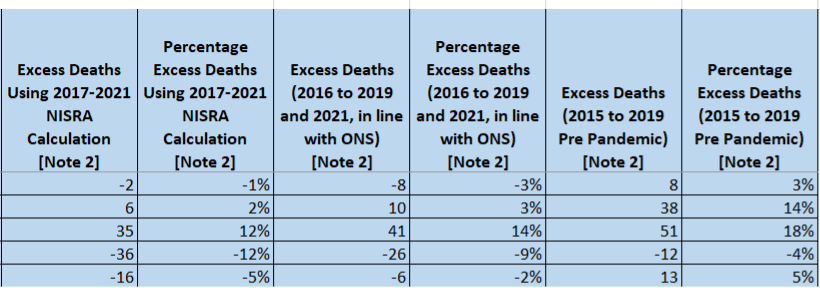
In those same 5 weeks, although the level of excess deaths had reduced (NISRA), using the ONS calculation we still had 11 excess deaths above the average and using the European calculation we had 98 excess deaths above the average.
It was convenient that they ignored the 5 weeks prior to their selection.

This 5-week period would have shown 206 excess deaths above the average using NISRA calculation and the 5 weeks following a fortnight after their selection showed another 156 excess deaths above the average. In fact, any 5-week period since March 2022 would have shown excess deaths, except for the period chosen by David Gordon, Ian Young and Michael McBride for inclusion in the reply.

We also know that using the ONS calculation and the European calculation would show even more excess deaths than those reported by NISRA.
In the case of the period, 29 July to 26 August the excess deaths were 223 (17 more) using ONS calculation and 278 (72 more) using the pre-pandemic calculation, whereas NISRA reported 206.
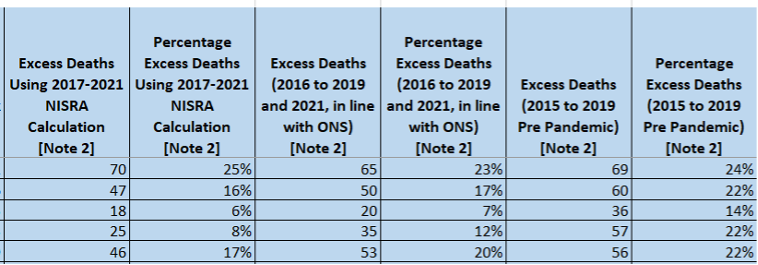
In the case of the period, 21 October to 18 November the excess deaths were 249 (86 more) using ONS calculation and 315 (159 more – more than double) using the pre-pandemic calculation, whereas NISRA reported 156.
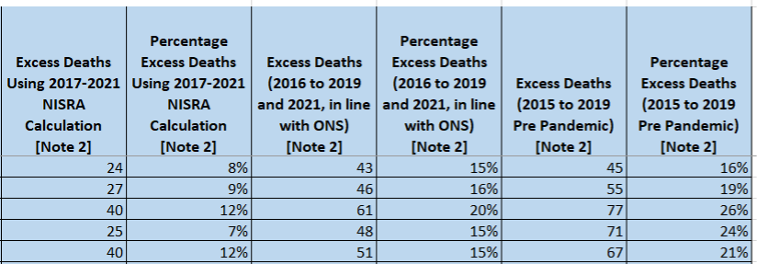
As I predicted in our earlier article, approaching the end of the year and including 2 pandemic years in the average is skewing the average upwards because of the peaks in deaths at the end of 2020 and 2021. This higher average is reducing the number of excess deaths reported by NISRA as can be seen by the greater differences using the other calculation methods as we approach the end of the year.
In short, if we go back to the graph of cumulative excess deaths over the year, the Department of Health would like us to focus on the small area within the green squares below as an indication of what is happening, while asking us to ignore the rest of the graph.
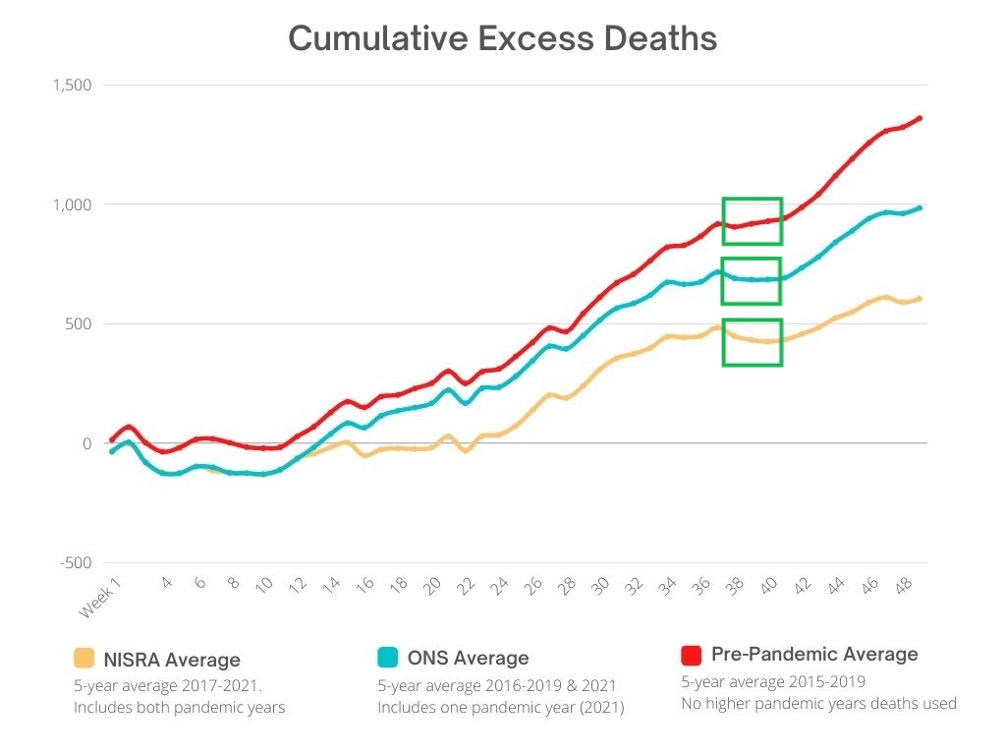
Now back to the email chain…
Ian Young then follows up with a further email regarding NISRA statistics. I have highlighted an ironic phrase.
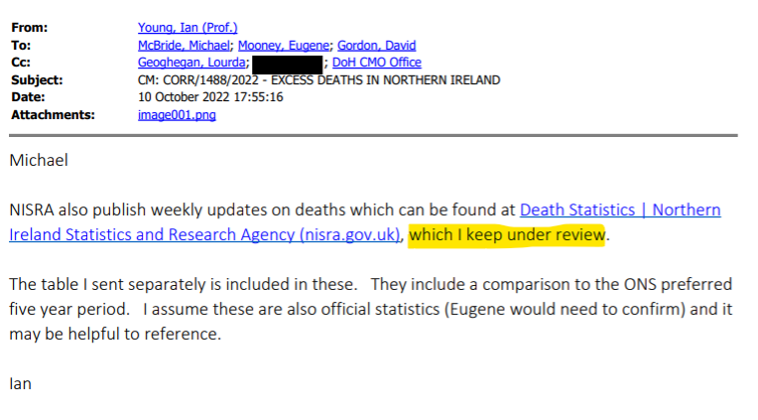
Isn’t it good to know that Ian Young keeps these statistics under review? So do we Mr Young! It’s just a pity that as you review them, you ignore the huge negative signal they are showing. Then you go completely duplicitous by selecting a tiny section and trying to claim that it is indicative of a change downwards. A change that both you and Gordon seem determined to sell rather than addressing the concerns raised by Mr Frew.
Michael McBride thinks this is a great table and suggests it should be used in the reply to Paul Frew. There is an extreme air of superiority in McBride’s replies regarding Paul Frew, we find.
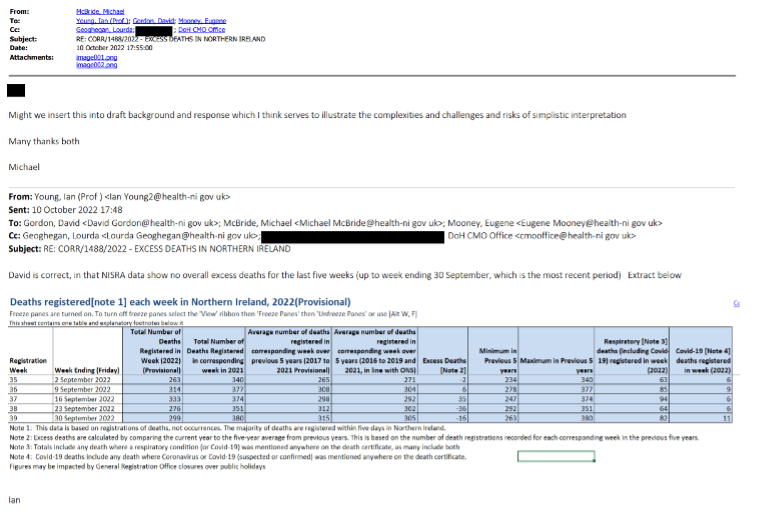
I don’t think anyone, least of all Paul Frew, has ever suggested that the excess death problem is simplistic. It can only be multifactorial. But unless the relevant experts first acknowledge the issue and then conduct a full and comprehensive investigation into the potential causes, we will never discover any of the factors causing this anomaly.
It is vital that we discover which causes are having an impact, especially the major factors, and then move to address those issues to stop our people from dying in large numbers. Otherwise, we can conclude that the Department of Health does not regard the health and well-being of the population as its appointed priority and are content to let things run as they are at present.
For too long this year we have had mealy-mouthed “experts” coming out with feeble excuses for the excess deaths ranging from ambulances not being able to admit patients to hospital, another claiming it was a UK-only phenomenon and another even blaming “the heatwave”. We thoroughly debunked these suggestions in our earlier article.
The remainder of the email exchange between the officials was a back-and-forth correspondence constructing the draft reply to Mr Frew. In short, the official reply was constructed as follows:
- The entirety of the first page was made up of the draft comments sent from NISRA
- Then the comment about no excess deaths in the previous 5 weeks and the table were inserted
- The following paragraph regarding Euromomo also came in the draft from NISRA
- The final 2 short paragraphs were drafted by the Dept of Health
This was then sent in complete form to the office of Robin Swann who printed it on headed paper, then placed it in front of him to be signed off. Even though every top official in the Department of Health (except Lourda Geoghegan) had direct input in the process, we can see how little effort the Department of Health actually contributed to the final reply.
Here is the reply again in all its glory. This time I have highlighted a couple of short extracts.
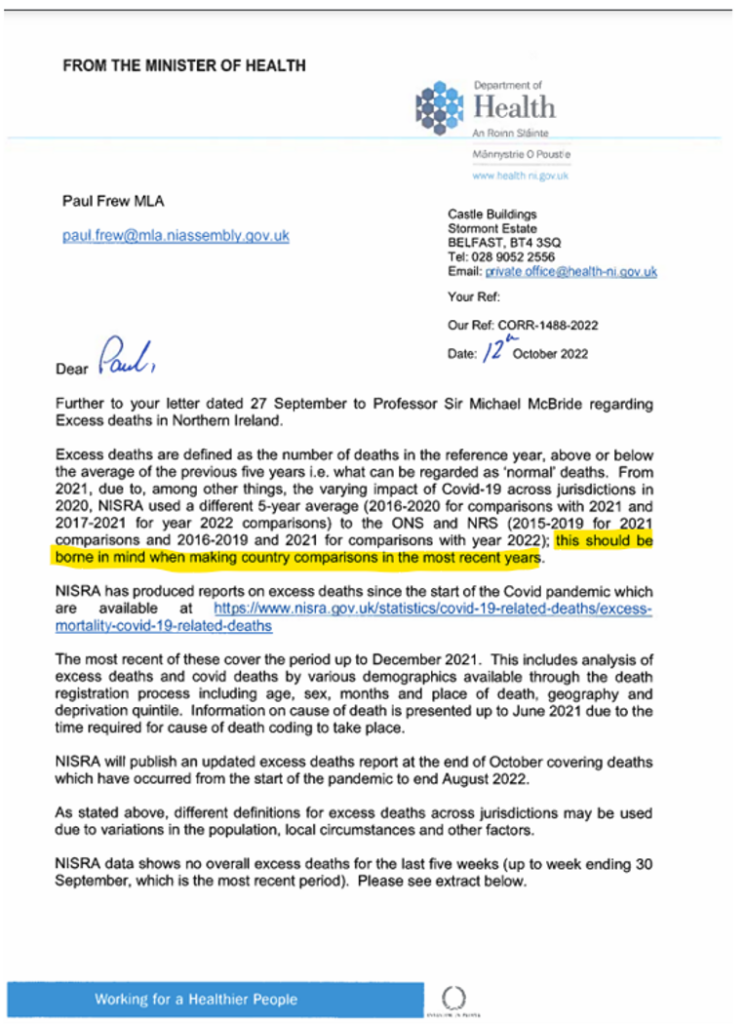
The highlighted sentence is a real peach. I started taking a deeper interest in how the statistics were produced for excess deaths after Robin Swan’s first reply to Paul Frew back in July 2022. It was in this letter that he had earlier contradicted his own advice, when he directly compared the level of excess deaths in Northern Ireland with those in England & Wales, stating that our excess deaths were 4.5% which was much lower than England & Wales.
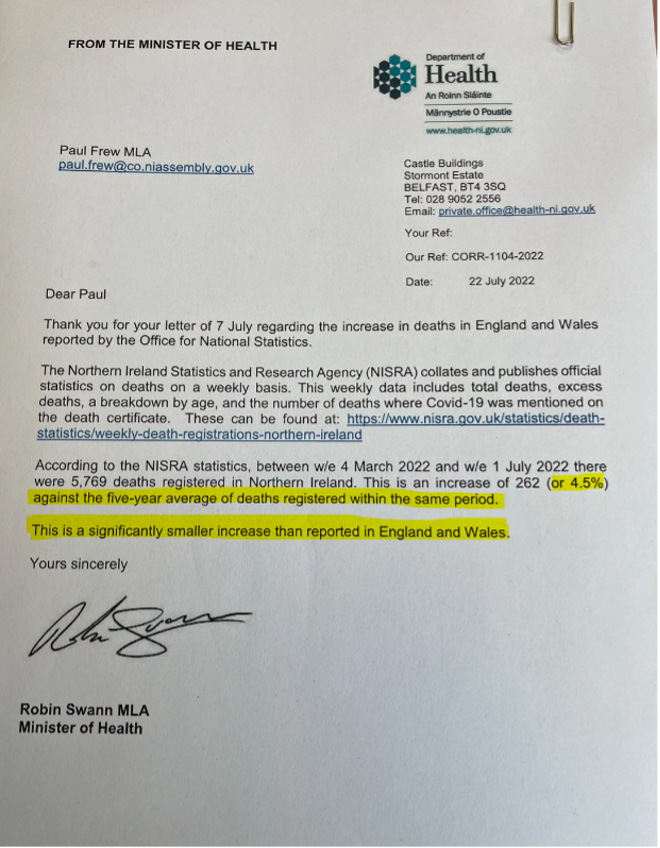
I was already aware that we did not use the same calculation as the ONS. This led me to start comparing the excess deaths weekly using the 3 different methodologies across the nations. When those figures were calculated in the same manner as the ONS – our excess deaths were actually nearly double that which Robin Swan had quoted, an issue we reported on earlier.
Most people are intelligent enough to realise it isn’t actually Robin Swann who writes these letters, but it is clear to see the inconsistencies in the replies emanating from the same departments.
The final part of Robin Swann’s reply contains a highlighted section from the minimal input from the Department of Health.
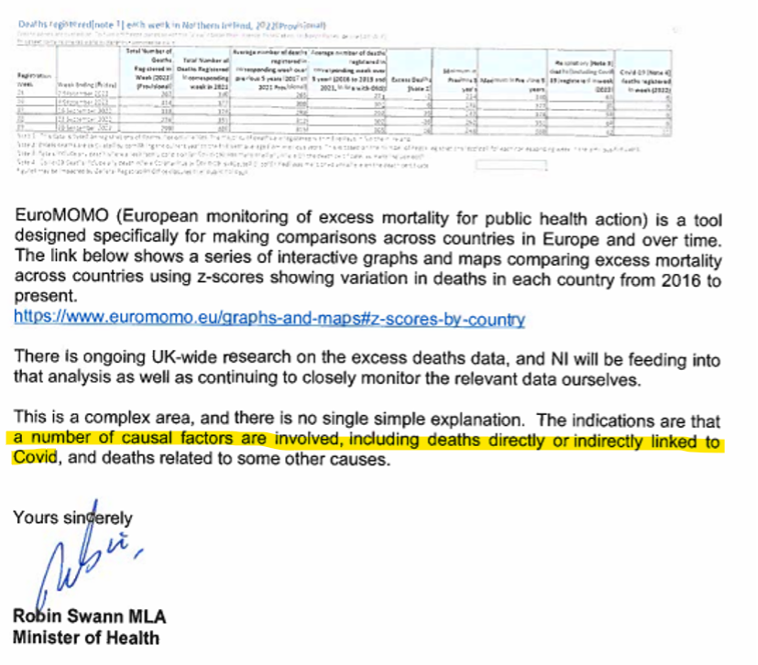
We know that the causes of excess deaths are likely to be multifactorial. However, we also know that this year’s excess deaths are NOT a result of Covid. They are non-Covid excess deaths. Yet Covid is the ONLY factor that the Department of Health feels compelled to mention. A clear indication that the transformation is complete, our Department of Health has morphed into the Department for Covid. It is the ONLY subject they can think or comment about.
Don’t be fooled though that this is a Northern Ireland or UK-only issue. It seems every country in the developed world is experiencing excess deaths this year on a large scale. Statistics on each country are published in the OECD Excess Deaths table and make for sobering reading. The only other common factor with these countries is that there are a limited number of politicians speaking up about the necessity to conduct an inquiry and as yet, none of them has. What could they possibly be trying to avoid?
Where to From Here?
Whilst we will continue to monitor and report on this issue, as I am sure Paul Frew will also do, we cannot do this alone. It is clear that our mainstream media are in bed with our government and are ignoring the issue.
It is worth remembering that the officials in the Department of Health are paid for by you and are put in a position to protect and represent you.
If the issue of our loved ones dying in greater numbers than normal concerns you, here is what you can do.
Even though MLAs are not sitting at present – they are still your elected representative. Write to your MLAs. You can find out who your MLAs are and their contact details here.
Highlight the issue and ask them to raise it in any future sitting. Refer to this article. If you don’t receive an acceptable reply, write to them again. Remind them of their responsibility to represent the concerns of their constituents rather than choosing to only represent their preconceived personal beliefs. Ask them if the lives of their non-COVID constituents are unimportant to warrant attention.
Do the same with your MP. Find your MP and contact details here.
Contact the Department of Health. Although we have redacted the direct email addresses of the top officials, you can contact them using their official contact details below. Write to them personally and hold their feet to the coals. The more of the public that takes action, the more uncomfortable they will be with their current position and the greater the chances they will be forced into investigating the matter.
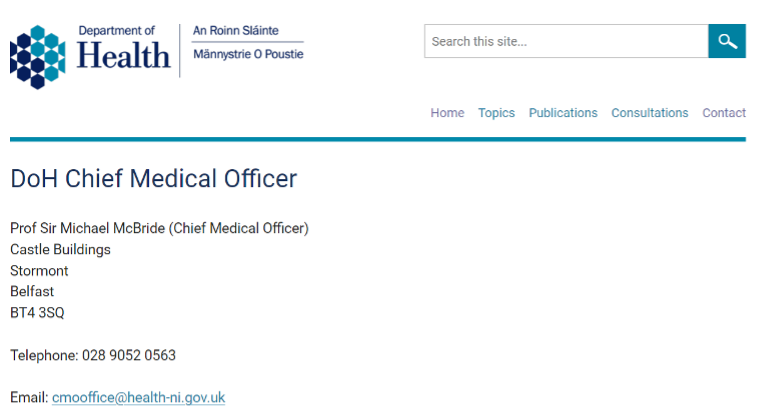
Can we be sure our top civil servants in public office are abiding by the 7 Principles of Public Life also known as the “Nolan Principles” – (no, not that Nolan!) which they are required to do?
The Principles are:
- Honesty
- Openness
- Leadership
- Integrity
- Accountability
- Objectivity
- Selflessness
I’ll let you decide for yourself.

So to answer the question we set out to answer at the beginning: Are there Conspirators Within The Northern Ireland Department Of Health?
The evidence is clear that the top Civil Servants at the DoH are at a minimum trying to frustrate Paul Frew’s efforts to get answers and also they are, at a minimum, attempting to obfuscate and downplay non-COVID excess deaths.
If they are not involved in a conspiracy to cover up then they are involved in a conspiracy of silence. They are then operating on the principle of:
DON’T ASK, DON’T TELL, DON’T LOOK


